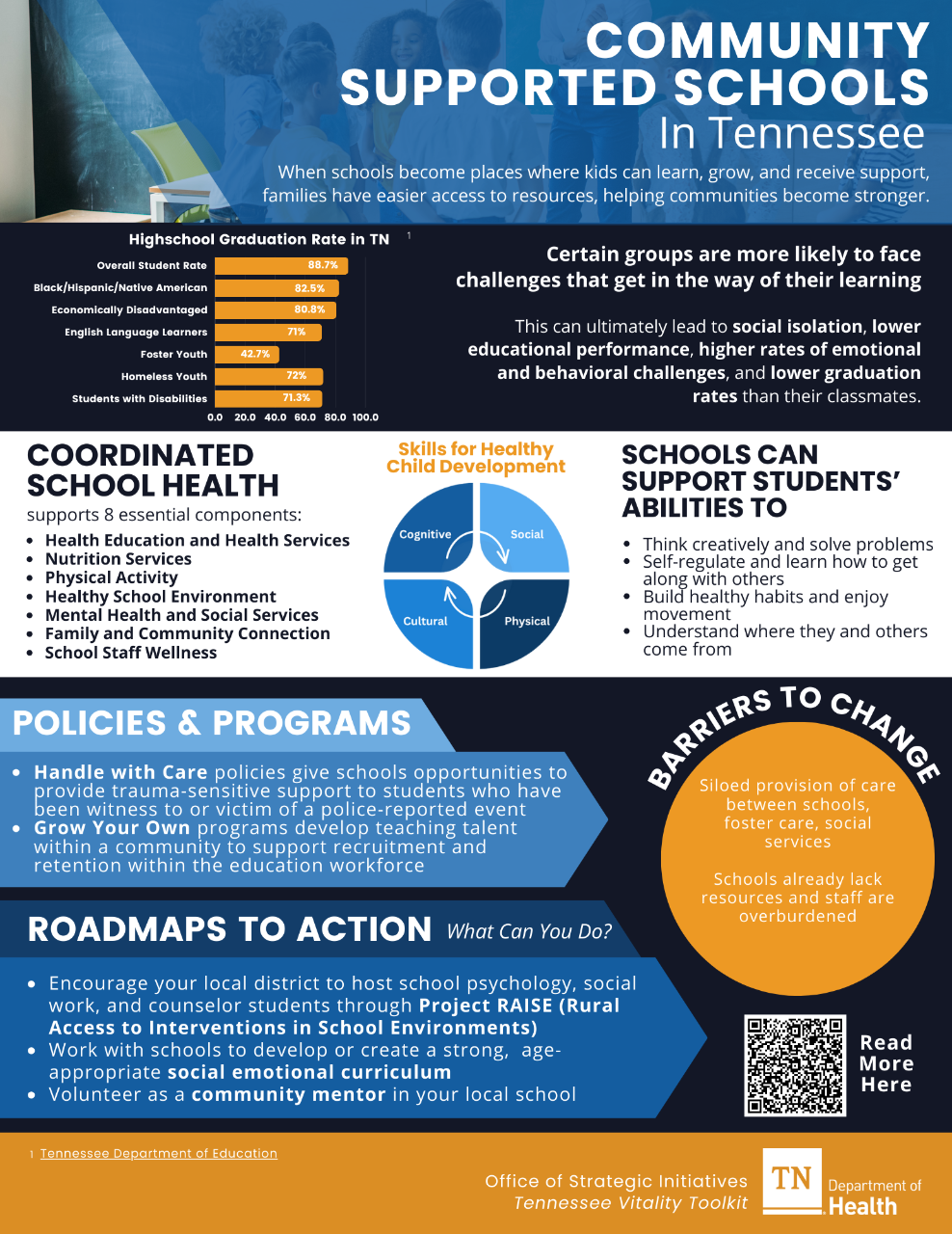Community Supported Schools
Schools are more than just places to learn reading, writing, and arithmetic. Schools offer space to support many abilities, including Cognitive, Social, Physical, and Cultural skills, which like the strands of a rope woven together, are all inter-related and each one is vital for healthy development.
Additionally, schools can provide services that support children within the context of their families, cultures, and communities. When we invest in our school systems to create and sustain community supported schools, we can improve the health and well-being of our students, our families, and our communities.
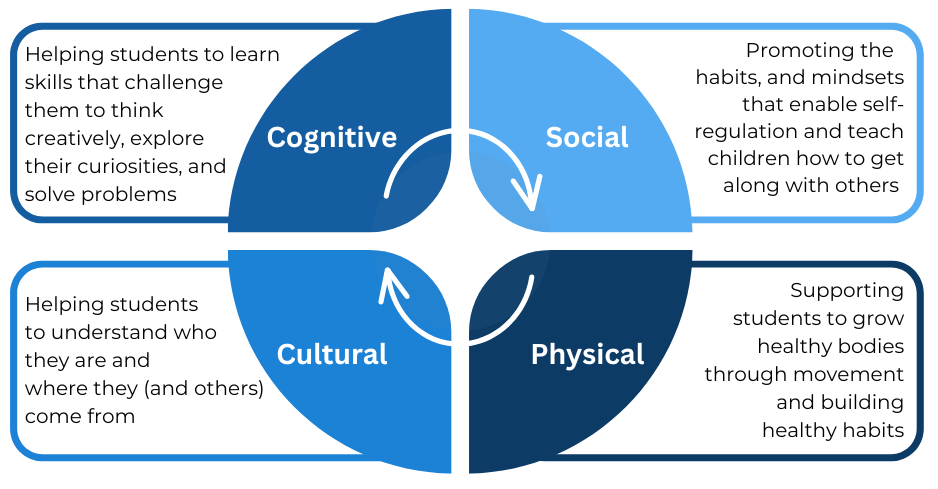
The coordinated school health approach describes essential school components that help students and families to thrive:
- Health Education and Health Services: Preparing students for a lifetime of healthy living, and meeting health needs as they arise
- Nutrition Services: Feeding students during and after the school day so they have the energy to learn
- Physical Activity: Providing opportunities for play and movement to grow healthy bodies
- Healthy School Environment: Making school a place where children feel safe and comfortable, including safe from bullying and discrimination
- Mental Health and Social Services: Nurturing students’ mental well-being through developing social and personal skills
- Family and Community Connection: Opportunities for families to be included in the school community
- School Staff Wellness: Initiatives to help school staff to be healthy, compensated, and supported as they care for students
When we invest in these factors in our schools, schools become spaces that are equipped to support children’s cognitive, physical, social, and cultural development, and that can support connected and resilient communities.
Schools set the stage for children to thrive personally and academically. The quality and level of education people receive are associated with later income, health, and overall higher life expectancy.
Children cannot learn if their social, emotional, and physical needs are not met. Schools can be a safe and trusted space for children to access resources that they might not find at home. Schools can be the hub of resources for a neighborhood, where resources like staff and space can be accessed for community benefit.
Unfortunately, most schools are not resourced to provide all the necessary services on their own. However, community organizations, parent-teacher organizations, and caring community members can come together to partner with schools and create meaningful neighborhood hubs. These schools are considered “community schools” and can be a trusted access point for services, resources, and education for students and their families.
For example, schools may partner with the local food bank to establish a food pantry. The school may integrate other resources within the food pantry, such as a clothing closet or diaper distribution, to meet other needs families may have. With support programs like a food pantry, families develop trust in the school as a safe and reliable community organization that supports a child’s growth and development more than just academically.
When schools become places where kids can learn, grow, and receive resources and support, families have easier access to resources, helping communities to strengthen and thrive.
Every student can face difficulties over the course of their education. Still, certain groups are more likely to face challenges that get in the way of their learning at school such as access to basic needs, having the proper tools for learning, or experiencing bullying or discrimination while at school. When we implement changes to design community supported schools, we provide an opportunity for all students to receive support that helps them meet their needs and their learning goals.
Youth in Foster Care
There are over 391,000 children in foster care in the United States and 14,558 in Tennessee alone, US Department of Health and Human Services (HHS) data shows. Children in foster care experience more Adverse Childhood Experiences (ACEs) than their classmates — even being placed in foster care is itself an ACE. Unstable housing and complicated family situations may make it so that these children have more on their mind when they come to school. They also may feel isolated from their peers and have trouble building critical relationships. Youth in foster care score lower on measures of educational performance and are far less likely to graduate high school than their classmates.
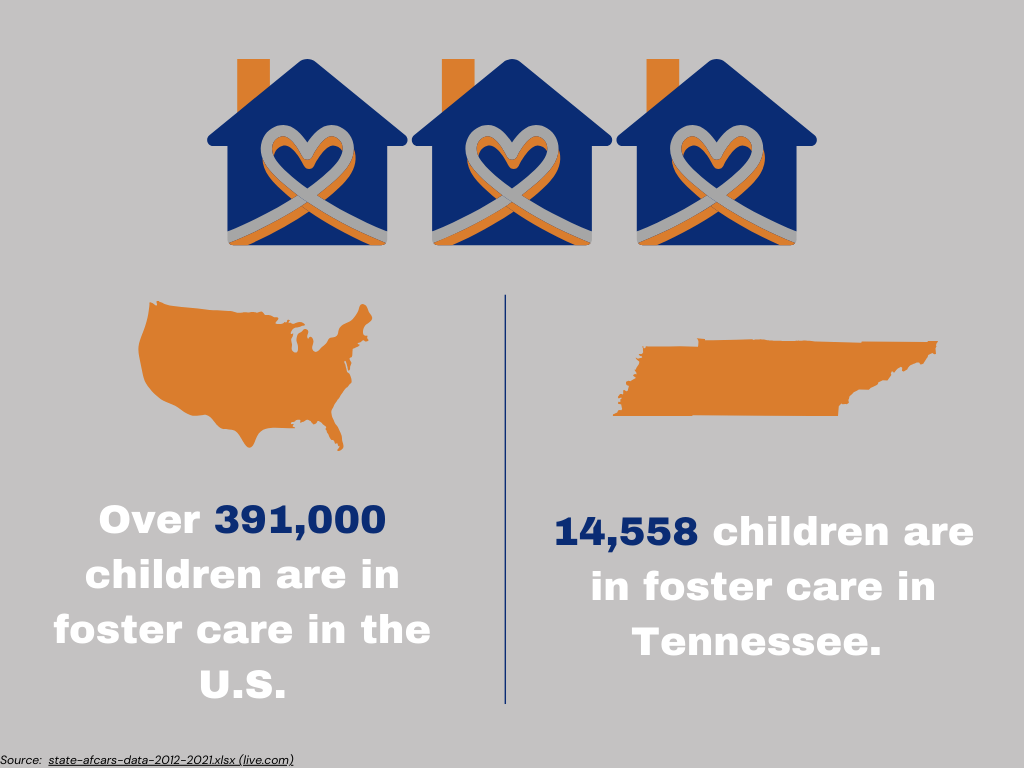
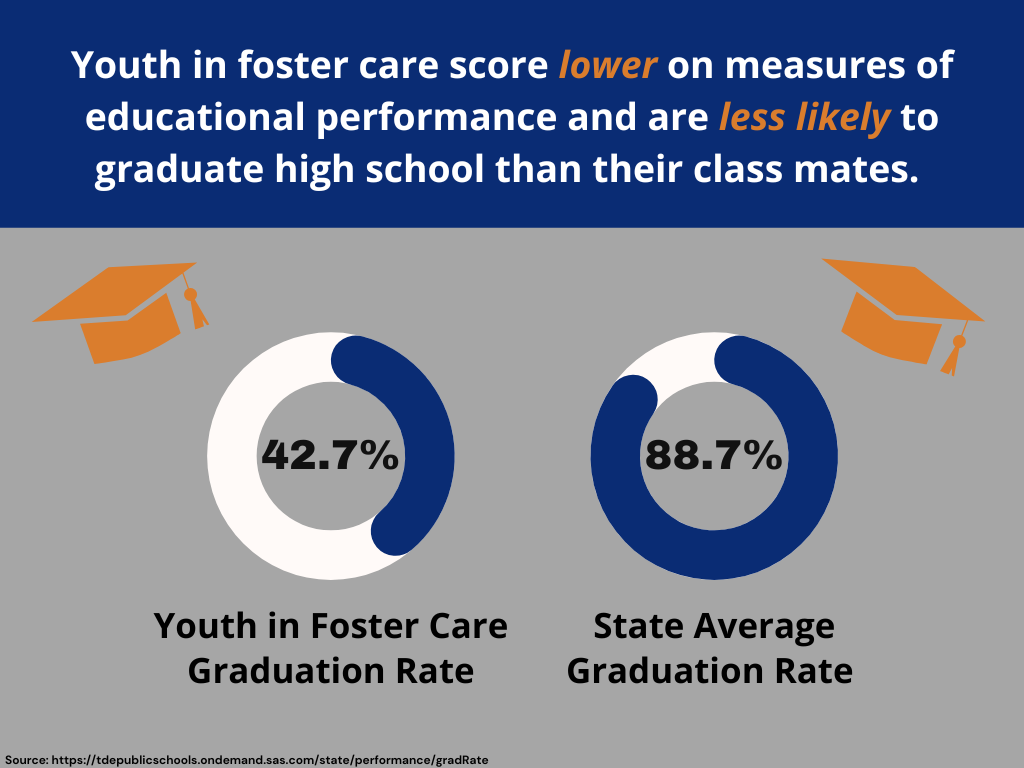
Students Experiencing Homelessness
According to the US Department of Education, 17,512 Tennessee public school students were unhoused during the 2021-22 school year. Housing instability harms healthy child development, and its impacts are seen in the classroom.
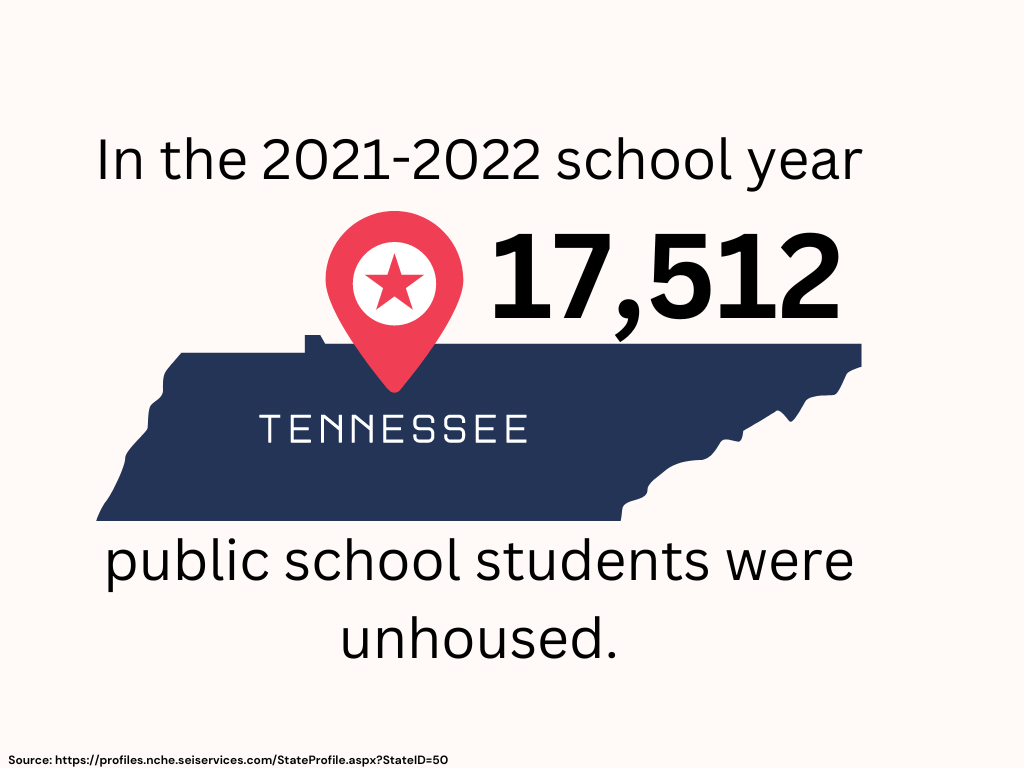
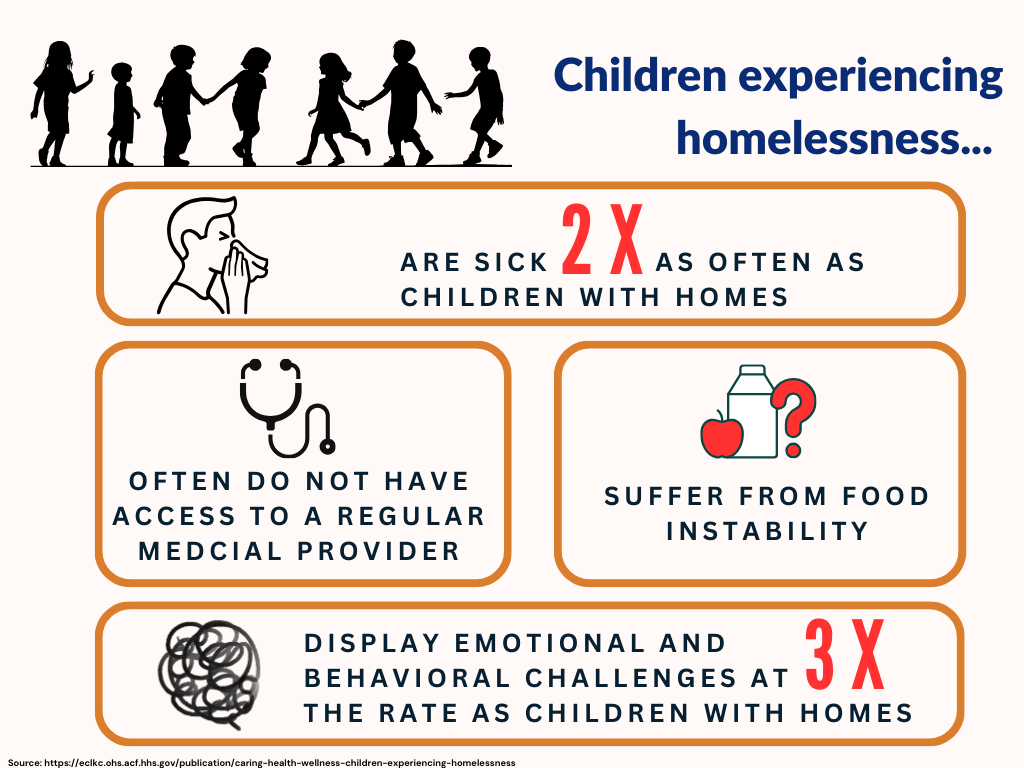
Students Experiencing Poverty
As of 2022, 30% of Tennessee students are considered economically disadvantaged, and 25% of Tennessee students are part of family who receives some form of public assistance. Students experiencing financial hardship face added challenges to learning and engagement in school, such as slower academic skill development at a higher rate of dropping out of school. According to a study by the Rural School and Community Trust, nearly 300,000 of Tennessee’s students attend rural schools, making it the fifth largest rural student population in the country. Census data shows that in Tennessee, 18.4% of children under age 18 were living in poverty in 2021 compared to 16.9% nationally, but rural counties saw rates as high as 42.6%. Community supported schools can provide access to resources that alleviate some symptoms of poverty and help families find a path to financial success.
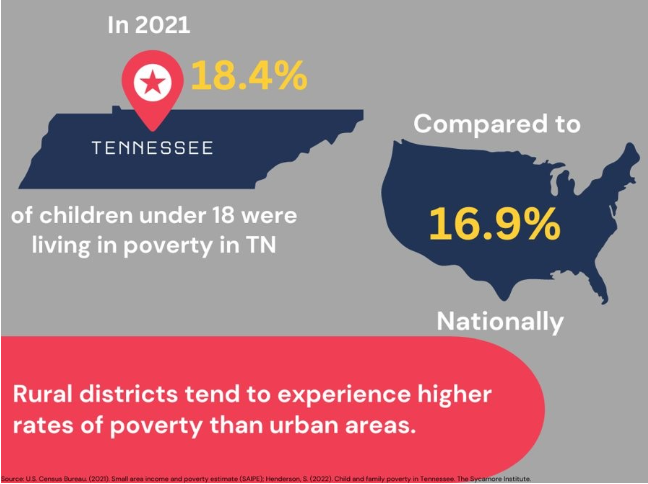
Uninsured Children
In 2022, 5.4% of children in Tennessee were uninsured. Uninsured children can seek out basic medical and mental health support from schools that are equipped with support staff such as nurses, social workers, or school counselors. However, only about 58% of Tennessee public schools have a full-time nurse on staff, and 56% of schools have zero or only one psychological professional on staff. Schools that are well-resourced with ample support staff have greater opportunity to support uninsured children with increased access to health resources.
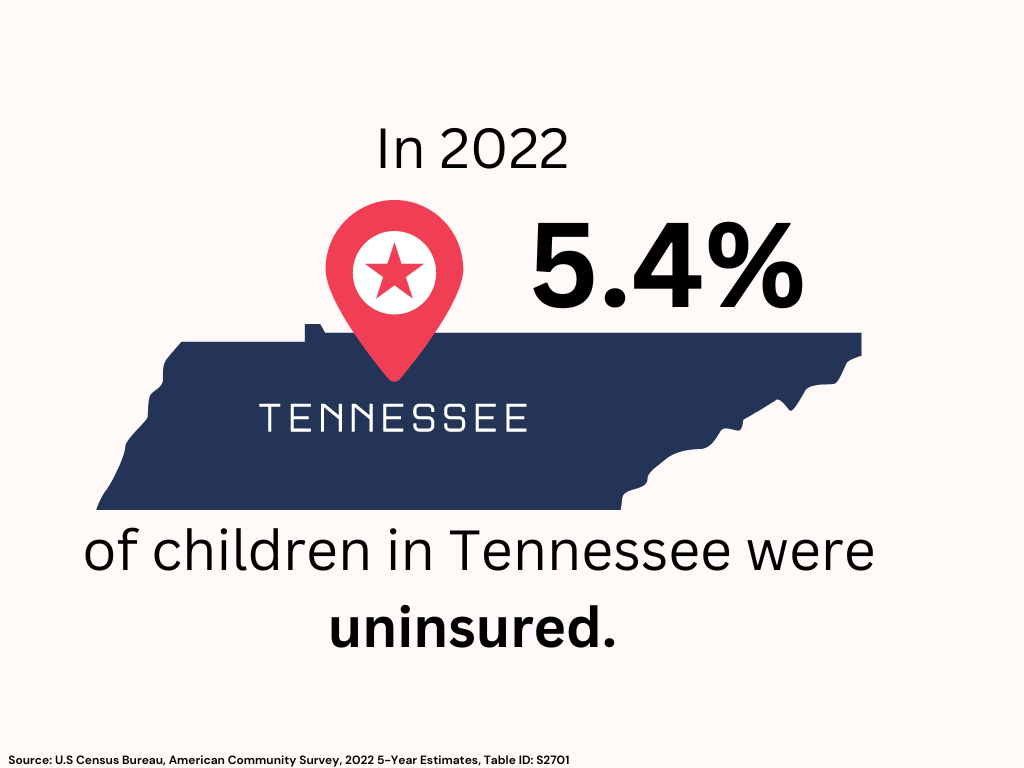
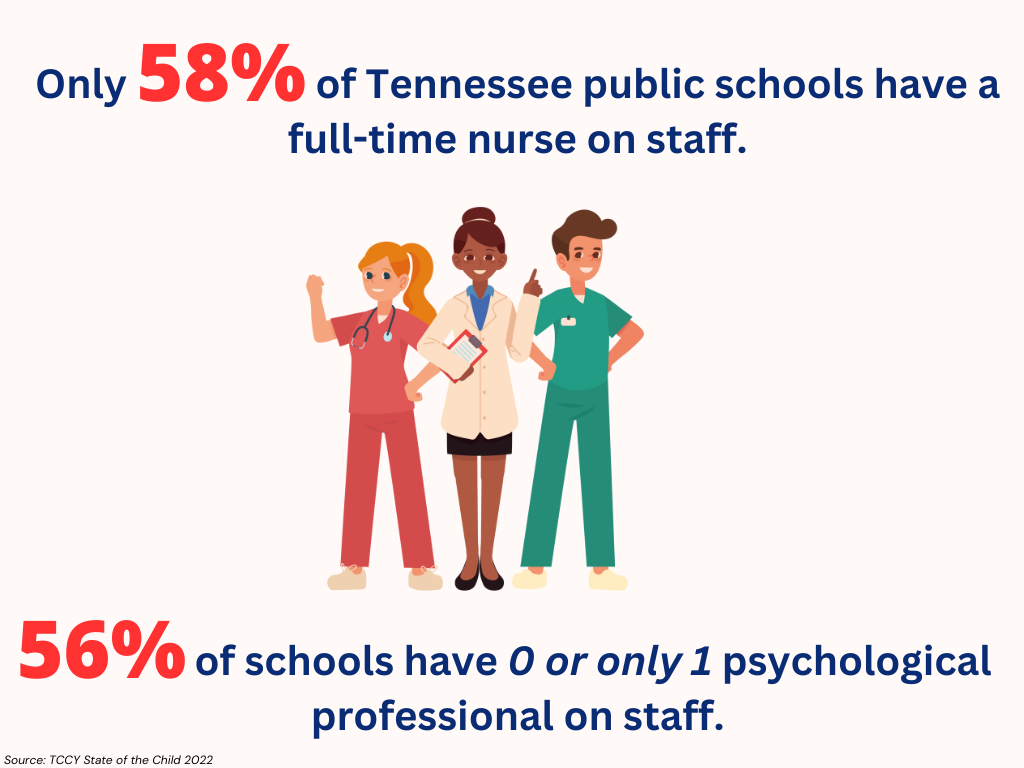
Students with Disabilities
An estimated 1 in 20 Tennessee children under age 18 have a known disability, according to US Census Bureau data. Yet, the National Center for Education Statistics reports that special education vacancies are the most difficult positions to fill, and that about 51% of Tennessee public schools with special education vacancies struggle to staff the position.
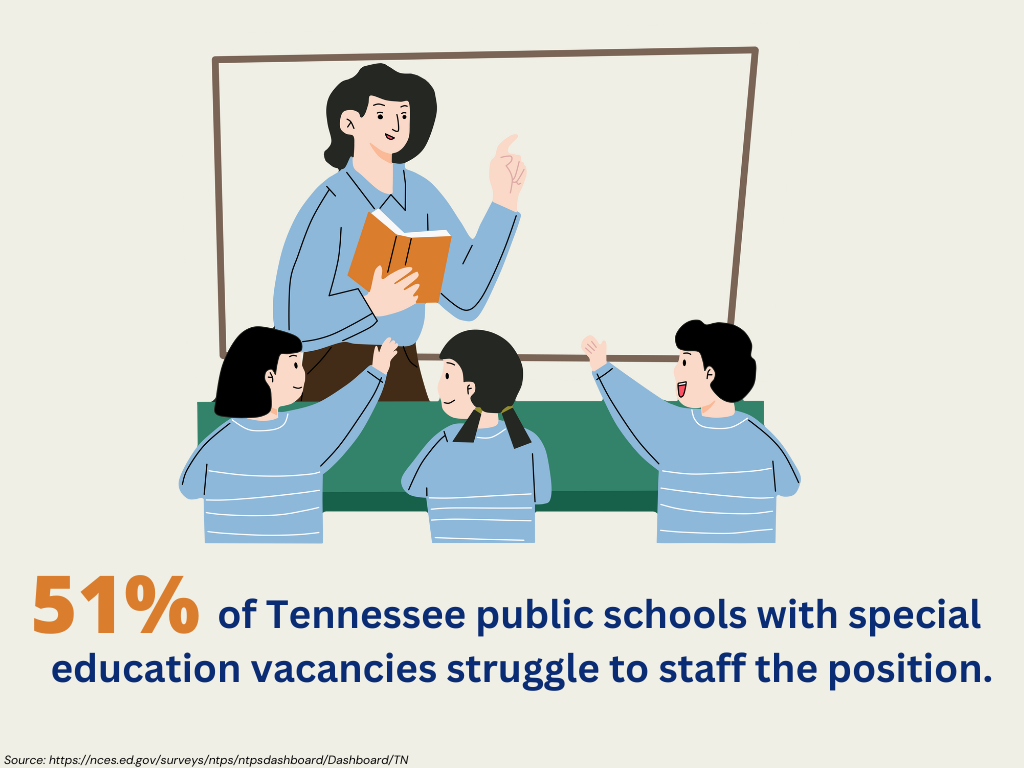
Racial and Ethnic Minorities
According to the Tennessee Department of Education, 40% of Tennessee students belong to racial or ethnic minority groups. Racial and ethnic minority students are more likely to report repeated school absences and are less likely to graduate on time. Additionally, standardized test results show that racial and ethnic minorities in Tennessee are more likely to score below proficient on 4th grade reading and 8th grade math exams. Expanding access to resources through the school system can help under resourced students to stay enrolled, present, and learning through graduation.
TDOE data also show that racial and ethnic minority students experience higher rates of suspension. Suspension is a form of exclusionary discipline – a punishment that removes a student from the learning environment. When students are excluded from school, they exhibit lower academic achievement, are less likely to graduate high school or attend college, and they are more likely to have contact with the juvenile justice system or the criminal justice system. The disparities in exclusionary discipline experienced by racial and ethnic minority students puts these students at greater risk for academic and lifetime consequences.
Community Supported Schools can foster a healthy school environment by focusing on inclusive, restorative discipline while providing essential resources to students and families. Expanding access to resources through the school system can help under resourced students to stay enrolled, included, and learning through graduation.
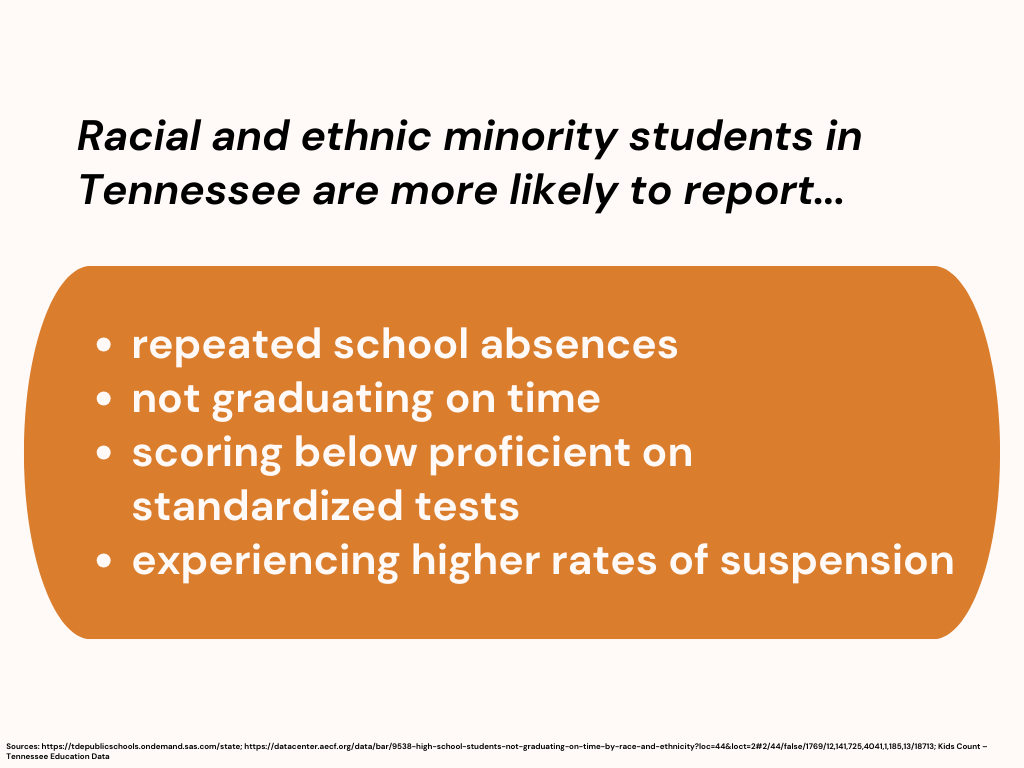
Immigrant Students
As of 2022, 1 in 5 Tennessee children in immigrant families live below the poverty threshold. In Tennessee, 24% of children in immigrant families live in linguistically isolated households, where no person over 14 speaks English “very well”. Additionally, 14% of children in immigrant families in Tennessee have resident parents with less than a 9th grade education. Lack of income stability and language access could make it harder for immigrant parents to support their children’s learning, or make it harder for families to know how to access needed resources provided by the school.
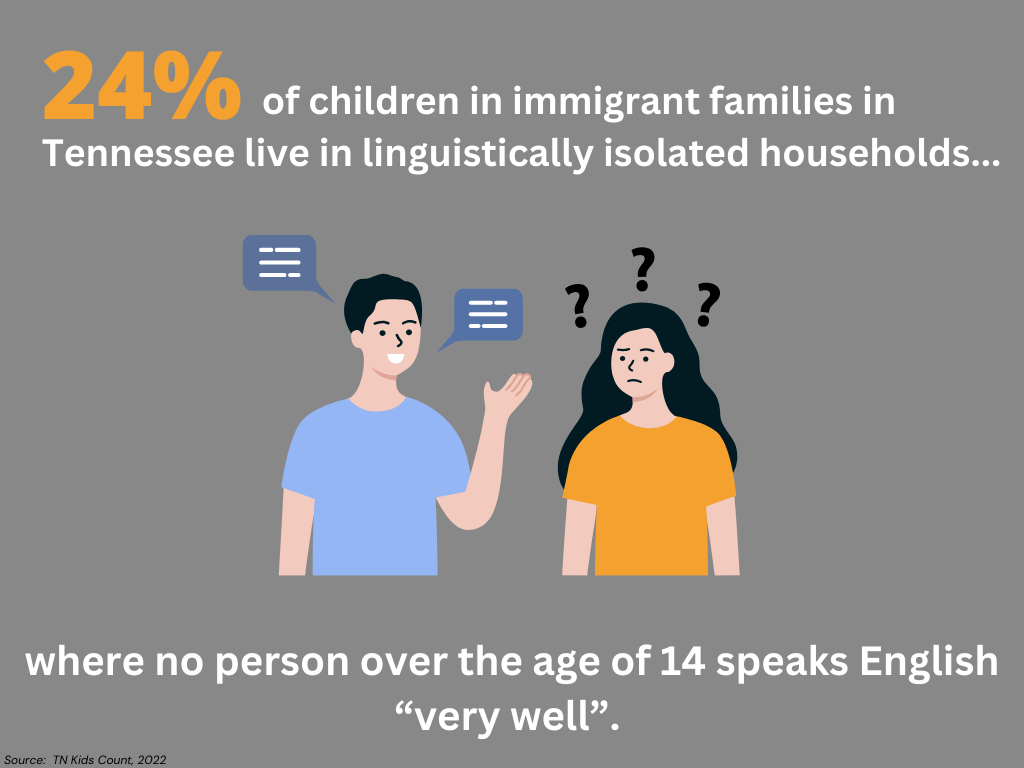
LGBTQ+ Students
Tennessee data from the Gay, Lesbian, & Straight Education Network (GLSEN) show that the majority of LGBTQ+ youth report experiencing anti-LGBT victimization at school. Many LGBT students report discriminatory practices at their school such as being restricted from LGBT expression (40%) and being prevented from including LGBT themes in extracurricular activities (27%). When asked about school support for LGBT students, only 20% of students reported that their school administration was supportive of LGBT students. Additionally, only 4% of students were protected by anti-bullying policies that included LGBT protections. These data demonstrate that for most LGBT students in Tennessee, school does not feel like a safe space.
However, evidence also shows that when schools establish trauma-informed policies and mental health services led by supportive adults, all students report better mental health, increased school attendance, and better engagement.
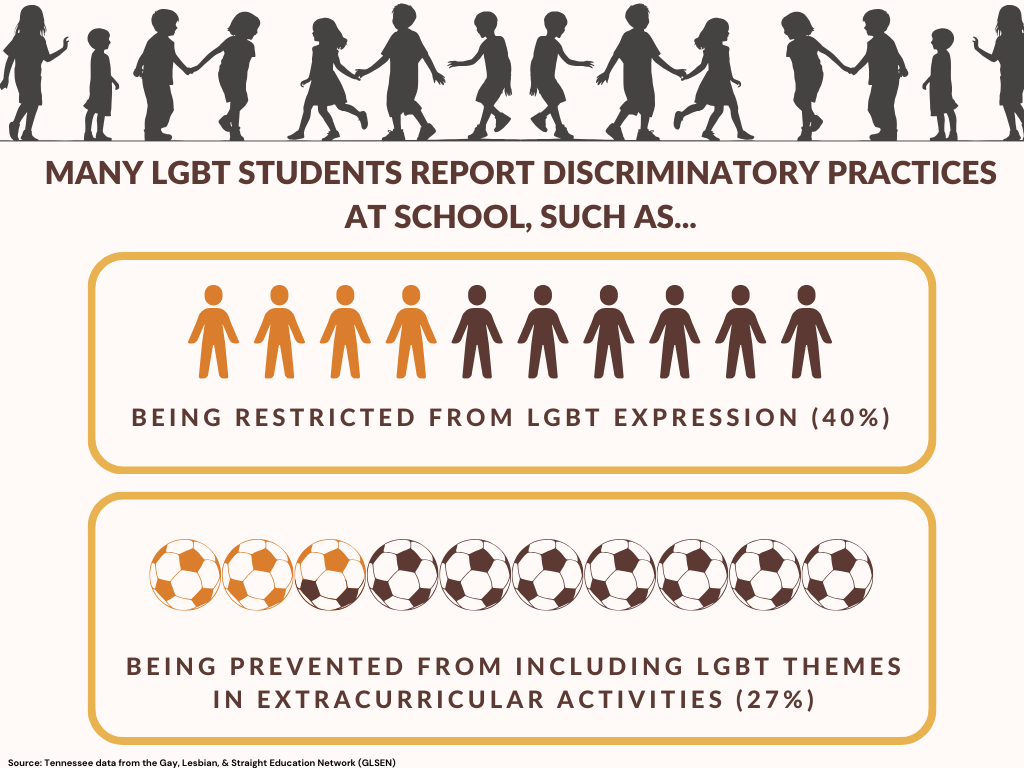
Activities and Programs: Evidence-informed, actionable, short-term steps that collaborative groups can take to address priority areas.
Policy and Systems Change: Systems change refers to how organizations or programs — such as school systems or health systems — are connected and work together to improve conditions to make change that lasts. This section contains evidence-informed, actionable, long-term steps that collaborative groups can take to address priority areas.
- Partner with Coordinated School Health in your community to equip schools to be places where community members can access the resources they need for family and student thriving.
- Collaborate with schools to host a supplies drive to make sure schools are equipped with free resources for students such as winter clothes, books, and other household items.
- Work with school districts to create food pantries in schools so that families can access a one-stop shop for needed resources.
- Partner with specialized nonprofits to embed resources like interpretation for parents, diaper and formula banks, mental health services, and employment opportunities into the school environment.
- Host resource fairs during school events such as parent-teacher conferences or open house day to bring resources and information straight to parents.
- Create local resource guides for needed resources such as financial empowerment, mental health, food security, or housing assistance. Distribute these guides at school events where families are present.
- Expand free or low-cost after-school and summer programming for students. These additional opportunities can buffer against learning loss and provide a positive, constructive environment for resource distribution, social connection, and academic support.
- Help establish a student advisory board at your local school so that students may collaboratively address the most pressing needs and goals of the student body. Greater student involvement contributes to a more positive school climate for all.
- Expand professional development opportunities on the science of learning and development (SoLD) to include all school personnel, not just teachers, so that all adults within the school system share a common understanding of SoLD principles. The SoLD Alliance is a good place to start.
- Facilitate a mentor program at your Local Education Agency to connect novice teachers with more experienced professionals. Encourage peer support networks among new instructors within and between schools. Research shows that these approaches help with teacher retention and professional development.
- Support or cultivate Grow Your Own (GYO) teacher initiatives in your area. Grow Your Own programs create a teacher pipeline by developing teaching talent within the community, connecting local schools with Educator Preparation Providers (EPPs).
- Build relationships with local school board members. You can start by inviting them to your Health Council meeting, sharing your goals for supporting students in the community, and discuss where your goals might align with theirs.
- Support local Tennessee School-Based Nutrition Programs and promote the community’s knowledge of existing services so that kids who qualify can access available services throughout the year. When students’ basic needs are met, they are better positioned to learn and less likely to disrupt the learning of others.
- Support local schools in becoming Trauma Informed Schools. Start by conducting trainings with administrators, teachers, and support staff on trauma-informed practices to help them better understand how trauma affects their students as they enter school, and how their own past can impact their work as educators.
- Collaborate with your local Family Resource Center (FRC) to strengthen school engagement in your area. Family Resource Centers offer a range of supports to meet the social, emotional, and material needs of students and their families including job training, mental health support, and parenting skills.
- Expand Communities in Schools to your county, or consider implementing principles from the Coalition for Community Schools. These programs work with schools to provide academic assistance, college and career readiness, basic needs, and social emotional skill building; referrals are also made to community partners when needed.
- Encourage your local district to host school psychology, social work, and counselor students through Project RAISE (Rural Access to Interventions in School Environments). This program works to increase access to mental health services for rural students and to develop the next generation of school mental health professionals.
- Support schools in adopting or strengthening their social-emotional curriculum. Strong social skills in the early years lead to later success at school and work. Studies have also shown that these skills can decrease the chance of later involvement with the criminal legal system.
- Urge your local district to adopt trauma-informed school discipline policies. Context-based, supportive alternatives to exclusionary discipline, such as restorative justice programs, allow students to remain in school while teaching accountability and setting behavioral expectations.
- Increase collaboration for action between school support services and community stakeholders: counselors, county health councils, social workers, coordinated school health, school board members, and others.
- Volunteer your time at a local school or by mentoring youth in your community. Research shows that children develop in the context of relationships. A supportive, stable relationship with just one adult can build a child’s capacity for resilience.
- Establish a Handle with Care program. Handle with Care policies establish a connection between schools and law enforcement when a child has been the witness or the victim of a police-reported incident. When this occurs, the police will send a message to the child’s school that advises to “handle the child with care,” providing an opportunity for the school to provide trauma-sensitive support to the student.
Tennessee Department of Education
- TN Coordinated School Health is an approach that connects health and learning, and is spearheaded by the Office of Coordinated School Health at TDOE. It involves eight major components which include Health Education, Healthy School Environment, and Student, Family, and Community Engagement, among others. Every district in TN has at least one CSH Coordinator per state mandate. This is a great resource to further understand the multiple dimensions across education which work together to impact student health.
- TDOE Trauma-Informed Schools offer resources for families, teachers, and administrators to create trauma-informed schools in Tennessee. This involves creating a safe and supportive school environment that recognizes the impact of trauma on student wellbeing.
- Family Resource Centers are resource and support hubs that engage with their communities to empower students and families. They provide direct services to address basic necessities and coordinated care, and also make referrals to other community resources.
- TN Social Personal Competencies Resource Guide can help you familiarize yourself with the aspects of Social and Personal Competencies, including decision-making and relationship skills, in the context of Tennessee’s schools.
- TN Comprehensive School-Based Mental Health Resource Guide is a very comprehensive look through available and potential resources, especially for those particularly interested in collaborating with their local school district.
- TN Voluntary PreK provides Tennessee's three- and four-year-old children with an opportunity to develop school readiness skills, including pre-academic and social skills.
- Tennessee Best for All Central is an online hub for anyone in Tennessee to find free resources and information related to K-12 schools across the state, including lesson plans, classroom videos, professional development trainings, at-home resources and more.
- TN ALL CORPS is a grant matching program for school districts and community partners that funds increased access to learning time for students through small-group tutoring.
Tennessee Afterschool Network
- Tennessee Afterschool Network works to support youth and communities through initiatives addressing opioid use prevention, state-wide literacy, service-learning opportunities, and healthy lifestyles.
Middle Tennessee State University & State Collaborative on Reforming Education (SCORE)
- Tennessee Teach Back Initative provides funding to support recruitment and retention efforts among Tennessee’s teaching workforce.
Tennessee Commission on Children and Youth
- 2023 Tennessee State of the Child Report highlights issues of education, health, economics, and child welfare and youth justice which have impacted children across the state of Tennessee.
Centers for Disease Control and Prevention
- CDC’s Virtual Healthy School is an interactive tool that shows school staff and community members how to support the health and academic achievement of students through the Whole School, Whole Community, Whole Child (WSCC) model. Click around the rooms to see the various options for encouraging healthy schools.
Science of Learning and Development (SoLD Alliance)
- SoLD's Work lays out the basics of the science of learning and development. These elements are important to understand for anyone working with children or interacting with education policy.
Learning Policy Institute
- Whole Child Policy Toolkit provides an overarching explanation of the “why and how” of whole child education change. Its state policy library highlights the laws, policies, initiatives, and programs that states have adopted to align with whole child design.
- The Teaching Profession Playbook outlines methods to recruit, prepare, and retain a diverse educational workforce. Teachers who represent the racial, ethnic, and linguistic backgrounds of the students they serve are critical to the social and cultural development of Tennessee’s children.
Collaborative for Academic, Social, and Emotional Learning (CASEL)
- Fundamentals of SEL explains the basic framework of Social Emotional Learning (SEL) in childhood development, and how schools, families, and communities can be champions for SEL.
- SEL in Communities offers specific resources for Social Emotional Learning (SEL) advancement in communities, since research shows that students are more likely to develop these skills if they’re reinforced outside of school.
National Juvenile Justice Network
- Mapping Transformative Schools: From Punishment to Promise is a comprehensive report on how prioritizing trauma-informed, equitable school environments can help students thrive. Adopting these recommendations can help reduce racial and disability-based disparities in suspensions and expulsions.
US Department of Education
- Safe School-based Enforcement through Collaboration, Understanding, and Respect (SECURe) State and Local Policy Rubric, developed jointly with the Department of Justice, can be a useful tool for school districts that do utilize School Resource Officers, ensuring the prevention of unnecessary interactions between students and the criminal legal system.
